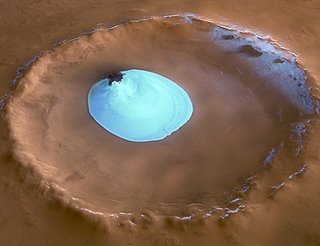
Sunday, June 28, 2009

NASA finds more evidence about water in Mars. Mars Reconnaissance Orbiter recently has sent back data showing fractures in the surface that are called water's footprints. It has spied hundreds of small fractures on the surface of the Red Planet. Scientists believe that billions of years ago, those fractures directed water flows through underground sandstone. Scientist believe that this is one more piece of evidence that water used to flow across the surface of our neighboring planet years back.
"These structures are important sites for future exploration and investigations into the geological history of water and water-related processes on Mars," said Chris Okubo, a planetary scientist at the U.S. Geological Survey in Flagstaff, Ariz. "Groundwater often flows along fractures such as these, and knowing that these are deformation bands helps us understand how the underground plumbing may have worked within these layered deposits."
In July, the Jet Propulsion Laboratory reported that its scientists had concluded that Mars was once awash in water. The orbiter sent back information showing that water was on Mars as far back as 4.6 billion to 3.8 billion years ago. NASA has the Reconnaissance Orbiter, two ground rovers and the Mars Lander all searching the planet for elements on Mars that could support life. The JPL noted that the period corresponds to the earliest years of the solar system. And the wet conditions were evident for thousands to millions of years after the waters formed clay, which later was buried by volcanic lavas.
NASA said in July that the scientists also found evidence of a system of river channels that flowed into a crater lake slightly larger than Lake Tahoe in California . This latest evidence of water shows not only surface erosion, but also groundwater effects that are widely distributed across the planet, according to NASA. "Groundwater movement has important implications for how the temperature and chemistry of the crust have changed over time, which in turn affects the potential for habitats for past life," said Suzanne Smrekar, deputy project scientist for the Mars Reconnaissance Orbiter, in a statement.
source : groundreport.com
Posted by Futurecamping
| Post a Comment
|
0
comments
|
![]()
NASA Returning to the Moon with First Lunar Launch in a Decade
Wednesday, June 24, 2009

GREENBELT, Md. -- NASA's Lunar Reconnaissance Orbiter launched at 5:32 p.m. EDT Thursday aboard an Atlas V rocket from Cape Canaveral Air Force Station in Florida. The satellite will relay more information about the lunar environment than any other previous mission to the moon.
The orbiter, known as LRO, separated from the Atlas V rocket carrying it and a companion mission, the Lunar Crater Observation and Sensing Satellite, or LCROSS, and immediately began powering up the components necessary to control the spacecraft. The flight operations team established communication with LRO and commanded the successful deployment of the solar array at 7:40 p.m. The operations team continues to check out the spacecraft subsystems and prepare for the first mid-course correction maneuver. NASA scientists expect to establish communications with LCROSS about four hours after launch, at approximately 9:30 p.m.
"This is a very important day for NASA," said Doug Cooke, associate administrator for NASA's Exploration Systems Mission Directorate in Washington , which designed and developed both the LRO and LCROSS missions. "We look forward to an extraordinary period of discovery at the moon and the information LRO will give us for future exploration missions."
The spacecraft will be placed in low polar orbit about 31 miles, or 50 kilometers, above the moon for a one year primary mission. LRO's instruments will help scientists compile high resolution three-dimensional maps of the lunar surface and also survey it at many spectral wavelengths. The satellite will explore the moon's deepest craters, exploring permanently sunlit and shadowed regions, and provide understanding of the effects of lunar radiation on humans.
"Our job is to perform reconnaissance of the moon's surface using a suite of seven powerful instruments," said Craig Tooley, LRO project manager at NASA's Goddard Space Flight Center in Greenbelt, Md. "NASA will use the data LRO collects to design the vehicles and systems for returning humans to the moon and selecting the landing sites that will be their destinations."
High resolution imagery from LRO's camera will help identify landing sites for future explorers and characterize the moon's topography and composition. The hydrogen concentrations at the moon's poles will be mapped in detail, pinpointing the locations of possible water ice. A miniaturized radar system will image the poles and test communication capabilities.
"During the 60 day commissioning period, we will turn on spacecraft components and science instruments," explained Cathy Peddie, LRO deputy project manager at Goddard. "All instruments will be turned on within two weeks of launch, and we should start seeing the moon in new and greater detail within the next month."
"We learned much about the moon from the Apollo program, but now it is time to return to the moon for intensive study, and we will do just that with LRO," said Richard Vondrak, LRO project scientist at Goddard.
All LRO initial data sets will be deposited in the Planetary Data System, a publicly accessible repository of planetary science information, within six months of launch.
Goddard built and manages LRO. LRO is a NASA mission with international participation from the Institute for Space Research in Moscow . Russia provides the neutron detector aboard the spacecraft.
Posted by Futurecamping
| Post a Comment
|
0
comments
|
![]()
Best outdoor games for children
Wednesday, June 17, 2009
Posted by Futurecamping
| Post a Comment
|
0
comments
|
![]()
Tips to help your camp a memorable one with children:
Monday, June 8, 2009
We are all kids at heart when it's comes to camping, and when your camping trip includes children some added planning which will make the trip more fun and unforgettable.
Here are some tips to help your camp a memorable one with children:
Build your kids interest, by getting them involved in the preparation from the very beginning; where to go, what to have, what to pack etc.
Think about the activities your children enjoy; bicycling, mountain climbing, swimming, enjoying nature. Then select your location accordingly.
If it's your first time camping, consider a state park with running water,
bathroom facilities and showers. This will keep the first trip positive and
will cheer a more adventuresome trip in the future.
Select activities that your family will take joy in together and bring or rent out the proper supplies, such as life vests, bicycles etc.
Practice setting up your tent. Involve the kids and let them play in the tent for a day.
First timers may want to have a backyard camp out, before heading out into the woods.
Create a checklist. Even superb mom forgets now and again.
Bring a flashlight for each and every family member and a battery operated lantern for each porch. Don't forget to bring plenty of batteries!
Keep the menu easy. Or else you'll waste most of your time cooking .
Some Suggestions :-
fruits are the best food Bananas, apples and oranges
soup and stews
chocolates,biscuits and soft drinks
Bagels, peanut butter, Hot Dogs and Beans
Peanut butter,bread and jelly
Keep in mind plenty of snacks, because everyone gets hungry in the great outdoors. Trail mix, chocolates, cereal bars, string cheese, crackers and dried fruit are the ideal snack foods.
Make sure each one gets a sleeping cushion or at least rolled up blankets to lie down before the resting bag is in place. A good nighttime sleep will keep everyone cheerful.
Purchase a First-Aide Kit and keep it with your camping materials. This will save time when the next trip comes.
Purchase second hand pots, pans plates etc plates etc. Eventually, you and the kids will be washing the dishes with sand by the river, just similar to the pros.
Remember the sunscreen...forgetting that can spoil a trip.
When camping with children at the shore, or any sandy place, I prefer sites with showers. This keep resting bags and tents, sand free.
Pack a fit outlines for hanging towels and wet things.
Speaking of wet items..lay plastic tarps down under your tents and take a few to additional in case it rains. Even "water resistant" tents may leak.
Try to maintain the travel time to a smallest amount and stop frequently.
Train your children about safety and how to value nature.
Learn and teach outdoor skills and outdoor principles.
Make the camp tasks extra fun have contests for get-together the most kindling, best camp cooking, fastest clean-up etc.
Posted by Futurecamping
| Post a Comment
|
0
comments
|
![]()